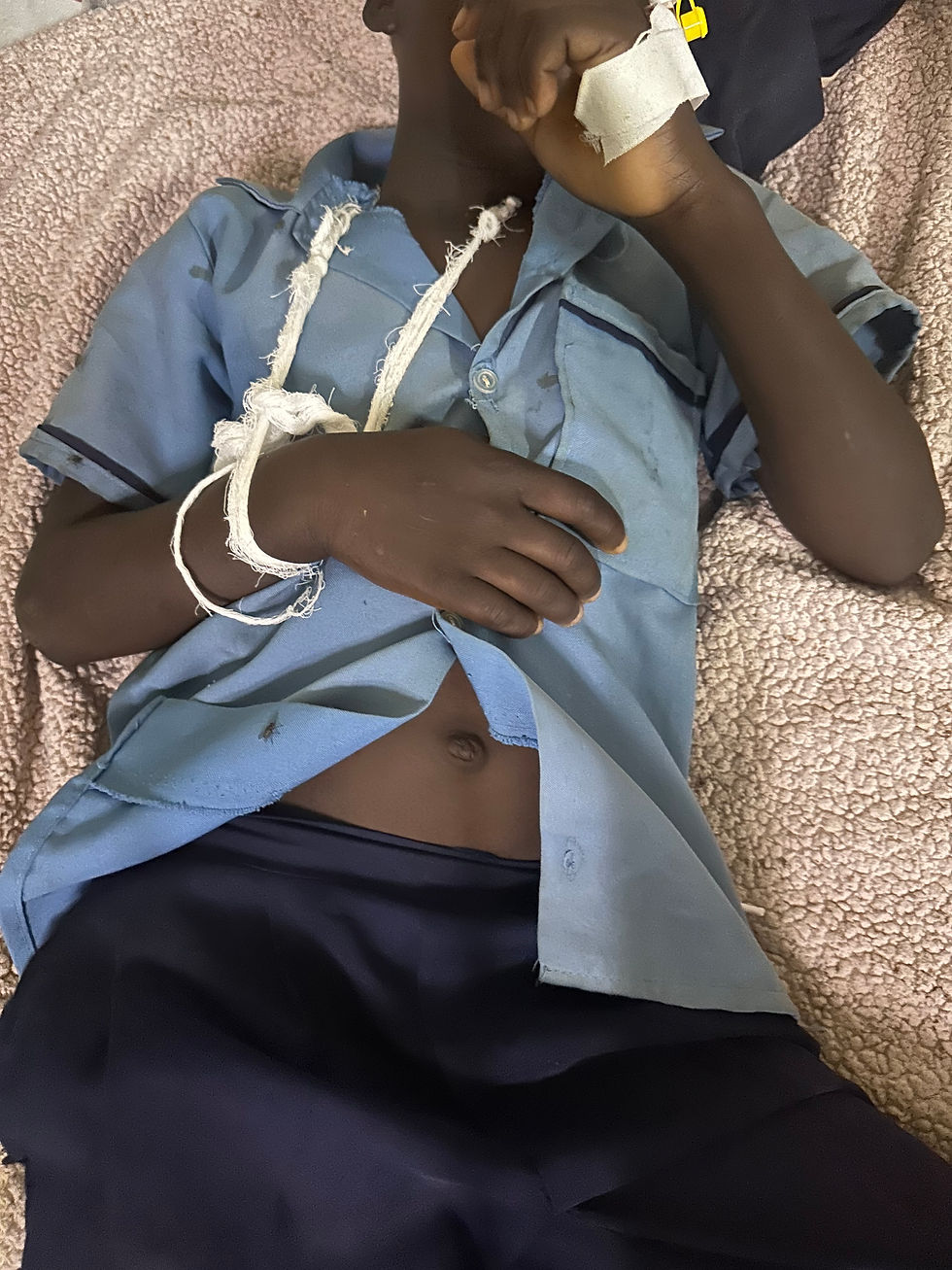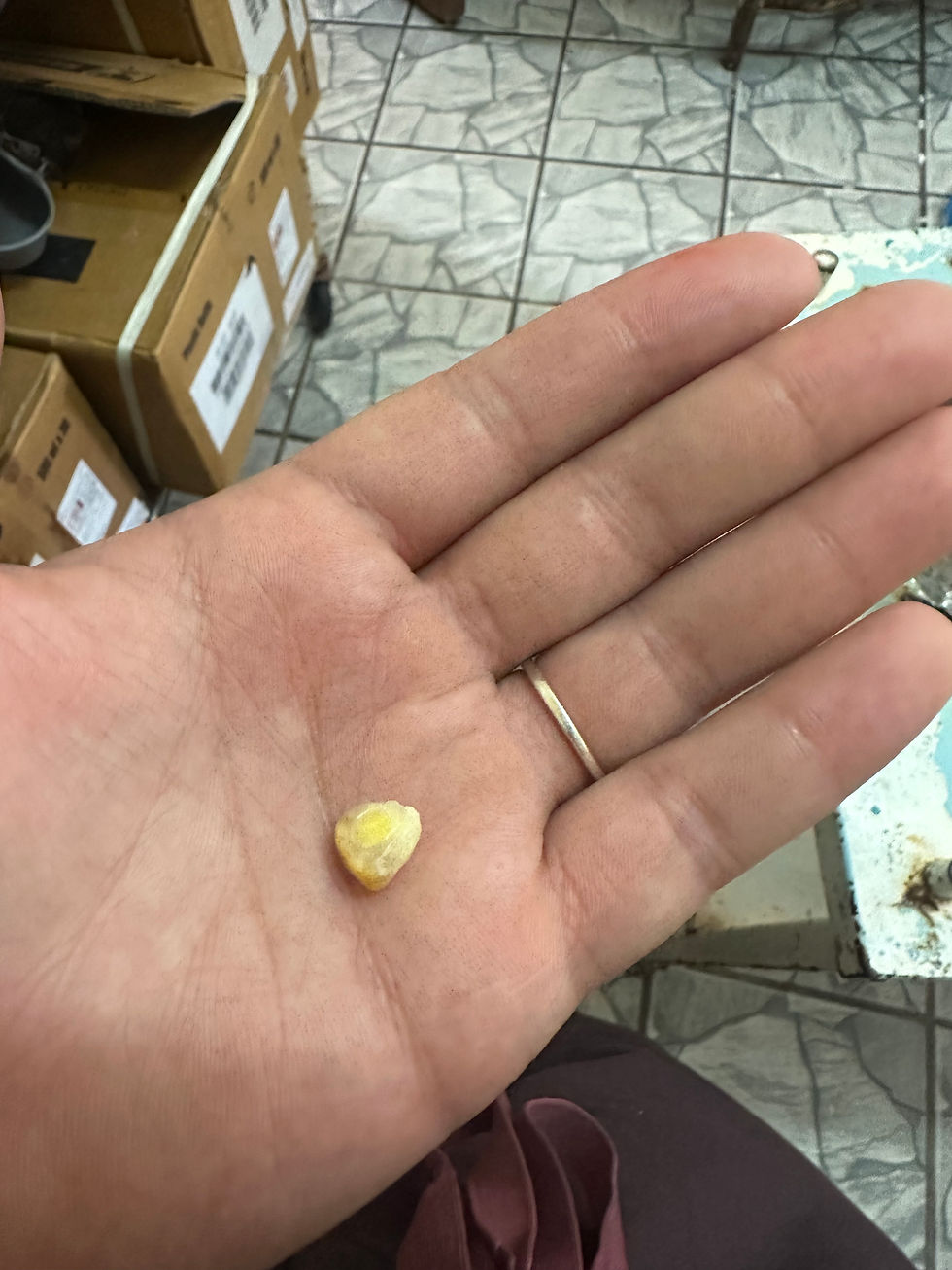The Why
- kdkazen
- Mar 3
- 5 min read
Hi! I apologize to all of my loyal followers (hi mom) for not writing for a while. Life has been life-ing and I have been alternating between periods of being completely overwhelmed and completely busy in the best way. The last 3 months have been a bit of a whirlwind but somehow it simultaneously feels like it's been a year since January 1st and like it should not be March already. All that being said, here are a few brief highlights of the year 2025 so far:
Going home at the end of January to see my grandma (& constantly marveling at God's goodness and her ability to miraculously recover)
Getting to host my friend and colleague Dr. Michael Zaskey for 1 month at Monze & going to swim in the Devil's pool at Victoria Falls
Reconnecting with some of my former patients and getting some sweet new Chitenge slings, hats, and masks made for the hospital (more on that later)
Walking away from a car accident that could have been much worse than it was with Dr. Padovany
Getting a bike to make up for the fact that I no longer have a car :') but also finding some cool new bike routes to explore around Monze
Seeing so many former attendings on Zoom meetings to do mock oral boards exams in preparation for the real thing coming in hot on March 25th
One of the most frequent questions I get both here and from people at home is some variation of "Why the heck are you in Africa". It's a fair question but one that I sometimes struggle to answer. In all honesty I have always felt drawn to Africa much in the same way that I was certain I would become a doctor at the age of 5 despite never having known a doctor or really even understanding what the job entailed. It has felt like the "next step" for as long as I can remember. I started seeking out opportunities to go abroad in high school and college but ultimately made a deal with my father that I wouldn't leave the country to do medical work until I had made it to medical school. First semester of medical school I enrolled in the Global Health elective, by the end of my first year I was in Uganda with the Kisoboka team, and the rest is history.
Initially, one of my greatest inspirations to pursue global health work came from Dr. Paul Farmer the founder of Partners in Health (if you aren't familiar with Dr. Farmer look up the book Mountains Beyond Mountains by Tracy Kidder it's a solid book about his incredible life). The more I learned about him and the work that he was doing to combat multi-drug resistant TB across the world, the more I realized how much our views aligned. One of Dr. Farmer's battle cries was the following:
"If access to healthcare is considered a human right, who is considered human enough to have that right?"
On that note, access to safe, timely, and affordable surgical care has been recognized as a huge deficit across the world. As it currently stands, the Lancet Commission predicts that 9/10 (or 5 billion total) people living in low and middle-income countries to not have access to basic or life-saving surgical care near their homes. To illustrate this, there are currently around 100 registered surgeons in Zambia, a country that is home to 16 million people. 1/4th of these surgeons are located in the capital city of Lusaka, leaving a significant portion of the country without. During my time in Monze, I have been able to help train 3 surgical residents and 20+ interns on basic elective surgical procedures such as hernia repairs, hydrocelectomies, and excisions as well as more complex day-to-day scheduled and emergency operations. This is by far is the most important service I can provide to the country as solid training multiplies exponentially.
Beyond that, there are also so many things that I love about being in Africa. I love the people I work with and for. The patients are often gracious, kind, and very thankful. It is not infrequent that I am stopped in the street or in the market by a patient or family member wanting to say thank you. In general, people in low and middle-income countries are often extremely resourceful and we have much to learn in that regard. The crutches for all of our patients with fractures are made by the physio department out of wood based on each individual's measurements. Our feeding tubes are created from foley catheters or ET tubes. Our splints are made from cardboard. Not having access to material items is not an excuse for not doing something, rather it is a reason to think of creative solutions for how to do it without whatever you would traditionally use. Recently, I took a sling I bought from Amazon and a pile of Chitenge (cloth) I purchased at the market to Grace, one of my former patients and a bilateral amputee who is a trained seamstress and asked her if she could figure out how to recreate the sling for me so that I could give them to our patients with upper extremity fractures. Within 1 week she had created 50 slings for me. To say I was impressed is an understatement. But the ability to create alternate and affordable versions of market items such as slings using local materials is just in her nature. She has been doing it her entire life.
On Fridays during our major ward rounds, I usually bring lollipops to all of the kids and pass them out while we are examining them. It started as something that helped to calm down our burn patients while we looked at their wounds, but it has become a weekly thing that brings the patients and I both a little joy. Because I am a Muzungu (white person) with candy the kids often remember me and welcome me with smiles and waves even when I'm not on lollipop rounds. Recently, a 2 year old with a femur fracture that has been sitting on our ward with skin-traction on for the last 18 days waved me over to his bed. He was eating a small piece of roasted corn his family had purchased for him outside of the hospital. When I got to his bed he reached out his hand and gifted me a single kernel from his corn cob. It may not sound like much, but for a 2 year old with very little to his name, it is everything. Generosity begets generosity. It has been a pleasure to experience such reciprocity in Zambia. To become more thankful because they are thankful, more resourceful because they are resourceful, and more generous because they are generous.
I have no doubt my time here will make be a better surgeon but more importantly it has made me and will continue to make me a better human being. For that reason and more I consider this experience invaluable. For all of the good times and all of the times I want to pull my hair out. All of the lives saved and all of the lives that should not have been lost. For all of it I am grateful.
Katy
PS If you want to learn more about the organization that helped train my seamstress extraordinaire, Grace, it is called Health Help Zambia and they are doing incredible work providing individuals living with disabilities job training and employment opportunities. Here is a link to their website: https://hhi.org.uk/our-work/zambia/










Comments